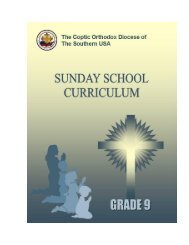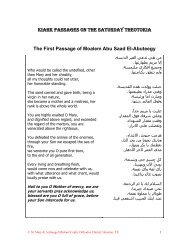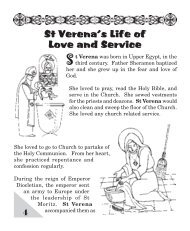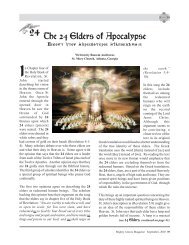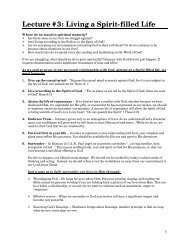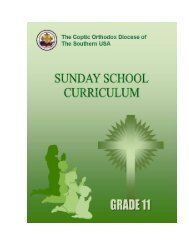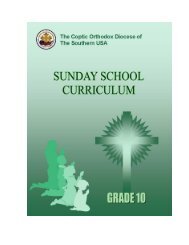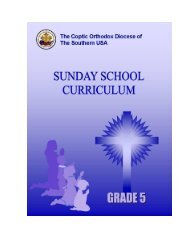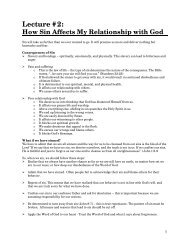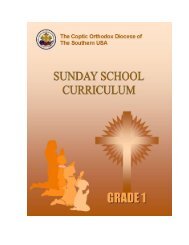Grade 12 - Coptic Orthodox Diocese of the Southern United States
Grade 12 - Coptic Orthodox Diocese of the Southern United States
Grade 12 - Coptic Orthodox Diocese of the Southern United States
Create successful ePaper yourself
Turn your PDF publications into a flip-book with our unique Google optimized e-Paper software.
Sunday School Curriculum <strong>Grade</strong> <strong>12</strong><br />
F. Hardness<br />
Some cases <strong>of</strong> judging o<strong>the</strong>rs are accompanied by hard judgment or hard words. An example <strong>of</strong><br />
this is <strong>the</strong> scribes and Pharisees who brought <strong>the</strong> sinner woman after exposing her in front <strong>of</strong> <strong>the</strong><br />
people. Not being satisfied with <strong>the</strong> disgrace <strong>the</strong>y caused her, <strong>the</strong>y wanted to stone her according to<br />
<strong>the</strong> law (John 8:5). Ano<strong>the</strong>r example is <strong>the</strong> hardness <strong>of</strong> those who condemned <strong>the</strong> Lord Christ to<br />
death. The hardness may be in <strong>the</strong> use <strong>of</strong> hurting words and may be by not giving excuses to <strong>the</strong> one<br />
judged.<br />
G. Oppressions<br />
Not all judgments are fair. There might be oppressive judgments as in <strong>the</strong> case when a person<br />
judges someone on <strong>the</strong> basis <strong>of</strong> what he heard about him by rumors. The oppression may be a result<br />
<strong>of</strong> an uncertainty and not making sure. An accused person is supposed to be innocent until his crime<br />
is established.<br />
H. Lying<br />
Lying may be a full lie or exaggeration. A full lie means that a person fabricates a talk against<br />
someone to defame him, knowing certainly that such talk is mere slander. He does so out <strong>of</strong> hatred or<br />
kind <strong>of</strong> revenge, judging that person is a compound sin involving many o<strong>the</strong>r sins.<br />
I. Self righteousness<br />
One who judges o<strong>the</strong>rs is usually forgetful <strong>of</strong> his sins. If a person remembers his own sins, he will<br />
not think <strong>of</strong> his bro<strong>the</strong>r‘s sins, talk <strong>of</strong> <strong>the</strong>m, or blame him for <strong>the</strong>m. Self-righteousness makes one<br />
feel better than <strong>the</strong> o<strong>the</strong>rs and judging <strong>the</strong>m increases arrogance when a person compares himself to<br />
someone <strong>of</strong> a lower level. A good example <strong>of</strong> this is <strong>the</strong> Pharisee and <strong>the</strong> tax collector.<br />
J. Hypocrisy<br />
A person who judges ano<strong>the</strong>r for some fault which he himself does or even worse is described by<br />
<strong>the</strong> Lord Christ as a hypocrite.<br />
III. Sayings Of The Fa<strong>the</strong>rs About Judging O<strong>the</strong>rs<br />
St. Irayes: It is good for one to eat meat and drink wine ra<strong>the</strong>r than eat <strong>the</strong> flesh <strong>of</strong> <strong>the</strong> bro<strong>the</strong>rs and<br />
drink <strong>the</strong>ir blood through slander.<br />
St. Pachomius: Do not despise anyone or judge him though you see him falling in sin. The<br />
teaching <strong>of</strong> <strong>the</strong> Bible asserts this rule in <strong>the</strong> story <strong>of</strong> <strong>the</strong> woman caught in adultery. The Lord thus<br />
gave us a lesson not to judge anyone even though we see him falling in sin.<br />
Mar Isaac: One who looks at <strong>the</strong> plank in his own eye, will not find time to look at <strong>the</strong> speck in his<br />
bro<strong>the</strong>r‘s eye. One who connects <strong>the</strong> weak points he sees in o<strong>the</strong>rs has found a spiritual mirror within<br />
him.<br />
IV. Judging Events But Not Persons<br />
Judging actions is permissible if it comes from someone having authority or under responsibility<br />
as a fa<strong>the</strong>r, a mo<strong>the</strong>r, a priest or supervisors.<br />
God does not prevent us completely from judging but commands us to follow justice, to judge in<br />
<strong>the</strong> proper time to judge a certain act, not everything and to avoid judging <strong>the</strong> person.<br />
The apostle says, ―Who <strong>the</strong>n are you to judge your neighbor‖ (James 4:<strong>12</strong>). We may answer and<br />
say: ―I am responsible <strong>of</strong> my bro<strong>the</strong>rs and sisters in Christ and <strong>the</strong>ir actions‖. We may advice and<br />
guide o<strong>the</strong>rs as <strong>the</strong> apostle says, ―if anyone among you wanders from <strong>the</strong> truth and it brought back by<br />
PENTECOST PERIOD 155



